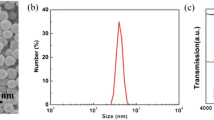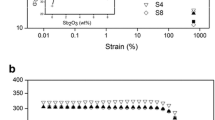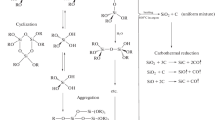Abstract
The solubility of poly(p-phenylene-benzimidazole-terephthalamide) (PABI) and its copolymer poly(p-phenylene-benzimidazole-terephthalamide-co-p-phenylene-terephthalamide) (CPABI) in N,N-dimethylacetamide (DMA) has been studied by laser microinterferometry. The solubility of PABI and CPABI in DMA (containing 3% LiCl) is 28.4% and 4.8% respectively and seems to be independent of temperature due to the LCST for both polymers. Microheterogenic mesophase was detected in PABI solutions at a concentration of 10.7–28.4%. The effect of temperature change rate and intensity of dynamic or continuous shear on microphase separation point of PABI and CPABI solutions was determined by a minimum of stationary or complex viscosity. The higher heating rate shifts the position of phase transition towards higher temperatures due to kinetic reasons. The increase in shear stress also elevates the phase separation temperature due to the intense mixing of the system and preventing formation of nucleation centers of a new phase. Large-amplitude shear oscillations help better maintain the system in a homogeneous state compared to a steady state flow due to the smaller influence on the conformation of macromolecular chains and their entropy. When deforming solutions are heated at a low rate, the effect of the shear on the phase equilibrium increases, and the phase separation temperature can shift to lower temperatures. Possible strategies for directed use of microphase separation to obtain aramid fibers and membranes have been discussed.











Similar content being viewed by others
References
Budnitskii GA (1990) Reinforcing fibres for composites. Fibre Chem 22:55–69. https://doi.org/10.1007/BF00555725
Avrorova LV, Volokhina AV, Glazunov VB, Kudryavtsev GI, Makarova RA, Oprits ZG, Tokarev AV, Semenova AS (1990) Third-generation man-made fibres produced in the USSR. Fibre Chem 21:298–305. https://doi.org/10.1007/BF00556106
Perepelkin KE, Machalaba NN (2000) Recent achievements in structure ordering and control of properties of para-aramide fibres. Mol Cryst Liq Cryst Sci Technol Sect A Mol Cryst Liq Cryst 353:275–286. https://doi.org/10.1080/10587250008025667
Tikhonov IV, Tokarev AV, Shorin SV, Shchetinin VM, Chernykh TE, Bova VG (2013) Russian aramid fibres: past−present−future. Fibre Chem 45:1–8. https://doi.org/10.1007/s10692-013-9471-7
Kotomin SV (2013) Polymer molecular composites–new history. J Thermoplast Compos Mater 26:91–108. https://doi.org/10.1177/0892705711419696
Li K, Li L, Qin J, Liu X (2016) A facile method to enhance UV stability of PBIA fibers with intense fluorescence emission by forming complex with hydrogen chloride on the fibers surface. Polym Degrad Stab 128:278–285. https://doi.org/10.1016/j.polymdegradstab.2016.03.033
Dai Y, Meng C, Cheng Z, Luo L, Liu X (2019) Nondestructive modification of aramid fiber based on selective reaction of external cross-linker to improve interfacial shear strength and compressive strength. Compos A Appl Sci Manuf 119:217–224. https://doi.org/10.1016/j.compositesa.2019.02.007
Luo L, Wang Y, Huang J, Hong D, Wang X, Liu X (2016) Pre-drawing induced evolution of phase, microstructure and property in para-aramid fibres containing benzimidazole moiety. RSC Adv 6:62695–62704. https://doi.org/10.1039/C6RA10184D
Engelbrecht-Wiggans A, Hoang TN, Bentley V, Krishnamurthy A, Kaplan L, Forster AL (2020) Effect of elevated temperature and humidity on fibers based on 5-amino-2-(p-aminophenyl) benzimidazole (PBIA). SN Appl Sci 2:705. https://doi.org/10.1007/s42452-020-2489-6
Dai Y, Yuan Y, Luo L, Liu X (2018) A facile strategy for fabricating aramid fiber with simultaneously high compressive strength and high interfacial shear strength through cross-linking promoted by oxygen. Compos A Appl Sci Manuf 113:233–241. https://doi.org/10.1016/j.compositesa.2018.07.034
McDonough WG, Dunkers JP, Forster AL, Heckert NA, Kim JH, Wight SA, Holmes GA (2015) Testing and analyses of copolymer fibers based on 5-amino-2-(p-aminophenyl)-benzimidazole. Fibers Polym 16:1836–1852. https://doi.org/10.1007/s12221-015-5195-z
Li K, Luo L, Huang J, Wang H, Feng Y, Liu X (2015) Enhancing mechanical properties of aromatic polyamide fibers containing benzimidazole units via temporarily suppressing hydrogen bonding and crystallization. J Appl Polym Sci 132:42482. https://doi.org/10.1002/app.42482
Nadi A, Boukhriss A, Bentis A, Jabrane E, Gmouh S (2018) Evolution in the surface modification of textiles: a review. Text Prog 50:67–108. https://doi.org/10.1080/00405167.2018.1533659
Arulvel S, Reddy DM, Rufuss DDW, Akinaga T (2021) A comprehensive review on mechanical and surface characteristics of composites reinforced with coated fibres. Surf Interfaces 27:101449. https://doi.org/10.1016/j.surfin.2021.101449
Palola S, Vuorinen J, Noordermeer JW, Sarlin E (2020) Development in additive methods in Aramid fiber surface modification to increase fiber-matrix adhesion: A review. Coatings 10:556. https://doi.org/10.3390/coatings10060556
Dai Y, Feng J, Meng C, Luo L, Qin J, Liu X (2019) Improving interfacial and compressive properties of aramid by synchronously grafting and crosslinking. Macromol Mater Eng 304:1900044. https://doi.org/10.1002/mame.201900044
Zhang B, Jia L, Tian M, Ning N, Zhang L, Wang W (2021) Surface and interface modification of aramid fiber and its reinforcement for polymer composites: A review. Eur Polymer J 147:110352. https://doi.org/10.1016/j.eurpolymj.2021.110352
Li T, Wang Z, Yu J, Wang Y, Zhu J, Hu Z (2019) Cu (II) coordination modification of aramid fiber and effect on interfacial adhesion of composites. High Perform Polym 31:1054–1061. https://doi.org/10.1177/0954008318818678
Yuan Y, Dai Y, Meng C, Luo L, Liu X (2019) Improving compressive strength of aramid fiber by introducing carbon nanotube derivates grafted with oligomers of different conformations and controlling its alignment. Macromol Mater Eng 304:1900127. https://doi.org/10.1002/mame.201900127
Ma L, Zhang J, Teng C (2020) Covalent functionalization of aramid fibers with zinc oxide nano-interphase for improved UV resistance and interfacial strength in composites. Compos Sci Technol 188:107996. https://doi.org/10.1016/j.compscitech.2020.107996
Cheng Z, Zhang L, Jiang C, Dai Y, Meng C, Luo L, Liu X (2018) Aramid fiber with excellent interfacial properties suitable for resin composite in a wide polarity range. Chem Eng J 347:483–492. https://doi.org/10.1016/j.cej.2018.04.149
Luo L, Wang Y, Dai Y, Yuan Y, Meng C, Cheng Z, Wang X, Liu X (2018) The introduction of asymmetric heterocyclic units into poly (p-phenylene terephthalamide) and its effect on microstructure, interactions and properties. J Mater Sci 53:13291–13303. https://doi.org/10.1007/s10853-018-2580-1
Ilyin SO, Brantseva TV, Kotomin SV, Antonov SV (2018) Epoxy nanocomposites as matrices for aramid fiber-reinforced plastics. Polym Compos 39:E2167–E2174. https://doi.org/10.1002/pc.24515
Fan W, Tian H, Wang H, Zhang T, Yang X, Yu Y, Meng X, Yu X, Yuan L, Xu B, Wang S (2018) Enhanced interfacial adhesion of aramid fiber III reinforced epoxy composites via low temperature plasma treatment. Polym Testing 72:147–156. https://doi.org/10.1016/j.polymertesting.2018.10.003
Baji A, Mai YW, Wong SC, Abtahi M, Chen P (2010) Electrospinning of polymer nanofibers: Effects on oriented morphology, structures and tensile properties. Compos Sci Technol 70:703–718. https://doi.org/10.1016/j.compscitech.2010.01.010
Chen S, Han D, Hou H (2011) High strength electrospun fibers. Polym Adv Technol 22:295–303. https://doi.org/10.1002/pat.1864
Papkov D, Delpouve N, Delbreilh L, Araujo S, Stockdale T, Mamedov S, Maleckis K, Zou Y, Andalib MN, Dargent E, Dravid VP (2019) Quantifying polymer chain orientation in strong and tough nanofibers with low crystallinity: toward next generation nanostructured superfibers. ACS Nano 13:4893–4927. https://doi.org/10.1021/acsnano.8b08725
Park JH, Rutledge GC (2017) 50th Anniversary perspective: advanced polymer fibers: high performance and ultrafine. Macromolecules 50:5627–5642. https://doi.org/10.1021/acs.macromol.7b00864
Sun G, Zhang M, Chen N, Niu H, Qi S, Wu D (2020) Fabrication of Ultrahigh-strength polybenzimidazole fibers via a novel and green integrated liquid crystal spinning process. Macromol Mater Eng 305:1900717. https://doi.org/10.1002/mame.201900717
Wyatt TP, Chien AT, Kumar S, Yao D (2014) Development of a gel spinning process for high-strength poly (ethylene oxide) fibers. Polym Eng Sci 54:2839–2847. https://doi.org/10.1002/pen.23842
Kaur J, Millington K, Smith S (2016) Producing high-quality precursor polymer and fibers to achieve theoretical strength in carbon fibers: A review. J Appl Polym Sci 133:43963. https://doi.org/10.1002/app.43963
Lancuski A, Vasilyev G, Putaux JL, Zussman E (2015) Rheological properties and electrospinnability of high-amylose starch in formic acid. Biomacromol 16:2529–2536. https://doi.org/10.1021/acs.biomac.5b00817
Kulichikhin VG, Ilyin SO, Mironova MV, Berkovich AK, Nifant’ev IE, Malkin AY (2018) From polyacrylonitrile, its solutions, and filaments to carbon fibers: I. Phase state and rheology of basic polymers and their solutions. Adv Polym Technol 37:1076–1084. https://doi.org/10.1002/adv.21758
Zhang X, Liu T, Sreekumar TV, Kumar S, Hu X, Smith K (2004) Gel spinning of PVA/SWNT composite fiber. Polymer 45:8801–8807. https://doi.org/10.1016/j.polymer.2004.10.048
Liu S, Tan L, Pan D, Chen Y (2011) Gel spinning of polyacrylonitrile fibers with medium molecular weight. Polym Int 60:453–457. https://doi.org/10.1002/pi.2968
Papkov SP, Kulichikhin VG, Kalmykova VD, Malkin AY (1974) Rheological properties of anisotropic poly (para-benzamide) solutions. J Polym Sci Polym Phys Ed 12:1753–1770. https://doi.org/10.1002/pol.1974.180120903
Kulichikhin VG (1989) Rheology, phase equilibria and processing of lyotropic liquid crystalline polymers. Mol Cryst Liq Cryst 169:51–81. https://doi.org/10.1080/00268948908062733
Borodulina T, Bermesheva E, Smirnova N, Ilyin S, Brantseva T, Antonov S (2014) Adhesive properties of liquid crystalline hydroxypropyl cellulose–propylene glycol blends. J Adhes Sci Technol 28:1629–1643. https://doi.org/10.1080/01694243.2014.908764
Smirnova VN, Prozorova GY, Iovleva MM, Papkov SP (1983) Estimation of the rigidity of polyamidebenzimidazole macromolecules in solutions. Vysokomol Soedin Ser B 25:527–529
Tsvetkov VN (1977) The structure of the monomer unit and the flexibility of rigid chain polymer molecules. Review. Polym Sci USSR 19:2485–2508. https://doi.org/10.1016/0032-3950(77)90329-X
Douglas JF (1992) “Shift” in polymer blend phase-separation temperature in shear flow. Macromolecules 25:1468–1474. https://doi.org/10.1021/ma00031a017
Kotomin SV, Il’in SO, Filippova TN, Shambilova GK (2013) Rheological and phase behavior of polyamidobenzimidazole solutions under the effect of temperature and deformation. Polym Sci Ser A 55:186–191. https://doi.org/10.1134/S0965545X13030036
Malkin AY, Kulichikhin VG, Polyakova MY, Zuev KV, Govorov VA (2020) Unexpected rheological behavior of solutions of aromatic polyamide in transient physical states. Phys Fluids 32:073107. https://doi.org/10.1063/5.0011718
Malkin A, Ilyin S, Roumyantseva T, Kulichikhin V (2013) Rheological evidence of gel formation in dilute poly (acrylonitrile) solutions. Macromolecules 46:257–266. https://doi.org/10.1021/ma301423u
Gorbacheva SN, Yadykova AY, Ilyin SO (2021) Rheological and tribological properties of low-temperature greases based on cellulose acetate butyrate gel. Carbohyd Polym 272:118509. https://doi.org/10.1016/j.carbpol.2021.118509
Rangel-Nafaile C, Metzner AB, Wissburn KF (1984) Analysis of stress-induced phase separations in polymer solutions. Macromolecules 17:1187–1195. https://doi.org/10.1021/ma00136a015
Vshivkov SA, Kulichikhin SG, Rusinova EV (1998) Phase transitions in polymer solutions induced by mechanical fields. Russ Chem Rev 67:233–243. https://doi.org/10.1070/RC1998v067n03ABEH000319
Malkin AY, Kulichikhin SG, Kozhina VA (1996) Phase separation in solutions of flexible-chain polymers under the action of shear deformation. Polym Sci Ser A 38:932–936
Malkin AY, Kulichikhin SG (1996) Stress-induced phase transitions in polymer systems. Polym Sci, Ser B 38:104–115
Karpukhina EA, Il’in SO, Makarova VV, Meshkov IB, Kulichikhin VG (2014) Phase state and rheology of polyisobutylene mixtures with decyl surface modified silica nanoparticles. Polym Sci Ser A 56(798):798–811. https://doi.org/10.1134/S0965545X14060066
Arinina MP, Ilyin SO, Makarova VV, Gorbunova IY, Kerber ML, Kulichikhin VG (2015) Miscibility and rheological properties of epoxy resin blends with aromatic polyethers. Polym Sci Ser A 57:177–185. https://doi.org/10.1134/S0965545X15020017
Ilyin SO, Kulichikhin VG, Malkin AY (2013) Unusual rheological effects observed in polyacrylonitrile solutions. Polym Sci Ser A 55:503–509. https://doi.org/10.1134/S0965545X13070018
Strelets LA, Ilyin SO (2021) Effect of enhanced oil recovery on the composition and rheological properties of heavy crude oil. J Petrol Sci Eng 203:108641. https://doi.org/10.1016/j.petrol.2021.108641
Iovleva MM (2001) Physicochemical aspects of examining the role and mechanisms of action of lithium chloride in solutions of fibre-forming polymers. Fibre Chem 33:172–176. https://doi.org/10.1023/A:1012309316529
Chalykh AE, Gerasimov VK (2004) Phase equilibria and phase structures of polymer blends. Russ Chem Rev 73:59–74. https://doi.org/10.1070/RC2004v073n01ABEH000859
Ilyin SO, Makarova VV, Polyakova MY, Kulichikhin VG (2020) Phase state and rheology of polyisobutylene blends with silicone resin. Rheol Acta 59:375–386. https://doi.org/10.1007/s00397-020-01208-6
Yadikova AE, Yashchenko VS, Makarova VV, Matveenko YV, Kostyuk AV, Ilyin SO (2020) Synthesis and properties of sulfonated copolymers of oxadiazole, dioxophenoxathiine, and diphenyl oxide. Polym Sci Ser B 62:47–60. https://doi.org/10.1134/S156009042001011X
Ilyin SO, Yadykova AY, Makarova VV, Yashchenko VS, Matveenko YV (2020) Sulfonated polyoxadiazole synthesis and processing into ion-conducting films. Polym Int 69:1243–1255. https://doi.org/10.1002/pi.6068
Boltzmann L (1894) Zur integration der diffusionsgleichung bei variabeln diffusionscoefficienten. Ann Phys 289:959–964. https://doi.org/10.1002/andp.18942891315
Ilyin SO, Makarova VV, Polyakova MY, Kulichikhin VG (2020) Phase behavior and rheology of miscible and immiscible blends of linear and hyperbranched siloxane macromolecules. Mater Today Commun 22:100833. https://doi.org/10.1016/j.mtcomm.2019.100833
Askadskii AA (2003) Computational materials science of polymers. Cambridge International Science Publishing, Cambridge
Ilyin SO, Malkin AY, Kulichikhin VG (2014) Application of large amplitude oscillatory shear for the analysis of polymer material properties in the nonlinear mechanical behavior. Polym Sci, Ser A 56:98–110. https://doi.org/10.1134/S0965545X14010039
Ilyin S, Kulichikhin V, Malkin A (2014) Characterization of material viscoelasticity at large deformations. Appl Rheol 24:13653. https://doi.org/10.3933/applrheol-24-13653
Malkin AY, Isayev AI (2017) Rheology: concepts, methods, and applications. ChemTec Publishing, Toronto. https://doi.org/10.1016/B978-1-927885-21-5.50001-1
Yadykova AY, Ilyin SO (2022) Rheological and adhesive properties of nanocomposite bitumen binders based on hydrophilic or hydrophobic silica and modified with bio-oil. Constr Build Mater 342:127946. https://doi.org/10.1016/j.conbuildmat.2022.127946
Papkov SP, Iovleva MM (1974) Classification of polymer-low molecular liquid systems according to their physical condition. Polym Sci USSR 16:614–619. https://doi.org/10.1016/0032-3950(74)90373-6
Rogovina LZ, Slonimskii GL (1974) Formation, structure, and properties of polymer gels. Russ Chem Rev 43:503–523. https://doi.org/10.1070/RC1974v043n06ABEH001821
Rogovina LZ, Vasil’ev VG, Braudo EE (2008) Definition of the concept of polymer gel. Polym Sci Ser C 50:85–92. https://doi.org/10.1134/S1811238208010050
Graessley WW (1980) Polymer chain dimensions and the dependence of viscoelastic properties on concentration, molecular weight and solvent power. Polymer 21:258–262. https://doi.org/10.1016/0032-3861(80)90266-9
Vitovskaya MG, Lavrenko PN, Okatova OV, Astapenko EP, Novakovsky VB, Bushin SV, Tsvetkov VN (1982) Hydrodynamic properties and equilibrium rigidity of polyamidobenzimidazole molecules in dimethylacetamide and sulphuric acid. Eur Polymer J 18:583–588. https://doi.org/10.1016/0014-3057(82)90035-0
Shtennikova IN, Garmonova TI (1983) Concerning the conformation of an aromatic polyamide in an organic solvent and in concentrated sulphuric acid according to flow-birefringence data. Polym Sci USSR 25:1906–1913. https://doi.org/10.1016/0032-3950(83)90311-8
Frenkel S (1974) Thermokinetics of formation of ordered structures in polymer solutions and gel. Pure Appl Chem 38:117–149. https://doi.org/10.1351/pac197438010117
Papkov SP (1977) The liquid crystalline state of linear polymers. Review. Polym Sci USSR 19:1–19. https://doi.org/10.1016/0032-3950(77)90142-3
Bheda J, Fellers JF, White JL (1980) Phase behavior and structure of liquid crystalline solutions of cellulose derivatives. Colloid Polym Sci 258:1335–1342. https://doi.org/10.1007/BF01668781
Ilyin SO (2015) Non-linearity in rheological properties of polymers and composites under large amplitude oscillatory shear. Polym Sci Ser A 57:910–923. https://doi.org/10.1134/S0965545X15060103
Acknowledgements
This study was carried out within the State Program of A.V. Topchiev Institute of Petrochemical Synthesis.
Author information
Authors and Affiliations
Corresponding author
Ethics declarations
Conflict of interest
The authors declare no conflict of interest.
Additional information
Publisher's Note
Springer Nature remains neutral with regard to jurisdictional claims in published maps and institutional affiliations.
Rights and permissions
About this article
Cite this article
Ilyin, S.O., Kotomin, S.V. Mesophase state and shear-affected phase separation of poly(p-phenylene-benzimidazole-terephthalamide) solutions in N,N-dimethylacetamide. J Polym Res 29, 326 (2022). https://doi.org/10.1007/s10965-022-03189-x
Received:
Accepted:
Published:
DOI: https://doi.org/10.1007/s10965-022-03189-x




